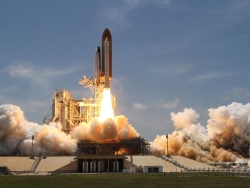2011 Science News: Mission Accomplished

The final voyage of the space shuttle Atlantis marked the end of NASA's space shuttle program
by Catherine McNiff
Ghost Particles Break Cosmic Speed Limit | Earthquake in Japan Causes Wide Destruction and a Nuclear Disaster | Gamers design new proteins that have disease-defying capabilities | Kepler Telescope Eyes New Planets | Tornadoes Ravaged Parts of the Southeast U.S. in April and May 2011 When the space shuttle Atlantis rolled into the Kennedy Space Center on July 21, 2011, it was for the last time. NASA's space shuttle program was initiated April 12, 1981, and for the last 30 years, has provided invaluable research, training, and exploration aboard a handful of spacecraft: Columbia, Challenger, Discovery, Atlantis, and Endeavor. These spacecraft may lay claim to impressive extraterrestrial feats like ferrying people into space and back, repairing satellites, conducting cutting-edge research, and building the largest structure to ever orbit Earth, the International Space Station (ISS). Now the space shuttle program has officially ended and the orbiters' days of flight are over. Atlantis, named for the long-lived two-masted Woods Hole Oceanographic research ship, flew the 135th and final mission flight, STS-135, for the shuttle program. She left Florida carrying 8,000 lbs of spare parts and supplies to the ISS as well as numerous science experiments in her capacious belly. She returned from space lighter in weight, heavy with data, sporting an odometer reading over 124 million miles. One of the experiments carried by Atlantis was a plant experiment developed at Kennedy Space Center's Space Life Sciences Laboratory (SLSL) which could impact the way we grow food on Earth as well as space. According to the NASA website, the purpose of the experiment "was to study the symbiotic relationship between plants similar to alfalfa, which is in the legume family, and specific nitrogen-reacting bacteria in microgravity." The data collected from this first-of-its-kind study could improve food production in general and in developing nations, reduce resupply costs for fertilizer, and guide researchers in the development of food sources for long duration space missions. |
- More from 2011 Science News









